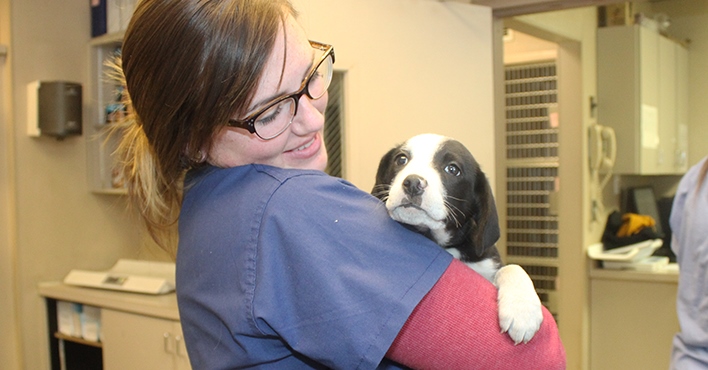Every year, when the seasons change from fall to winter you can count on two things – the arrival of colder weather in most regions of the country, and flu season rearing its ugly head. As many of us flock to our local medical centers to get the vaccination in hopes of avoiding the debilitating virus, let us not forget our four-legged friends.
Just like humans become susceptible to the flu around this time of year, so too does man’s best friend. However, when your dog or puppy gets the flu virus it’s often more difficult to detect and takes quite a toll on their bodies. The virus that causes dog flu, Influenza Type A (H3N8), was first identified in Florida in 2004, and causes respiratory signs (coughing, sneezing, nasal discharge). These symptoms can range in severity from mild to severe, and the most severe cases can include pneumonia.
The virus primarily infects the respiratory system and is extremely contagious, and while it can wreak havoc on their bodies, some dogs can be exposed to the virus and fight off infection without showing clinical signs. That’s why North Shore Animal League America Veterinarian, Dr. Christina Buchter is urging all doggy parents to make an appointment at their local veterinary center to immunize their pooch this season. Not only can you provide them with a better chance of escaping the season unscathed, but you can ensure that your best friend lives a healthy life for many years to come.
Although the vaccine does not guarantee your dog or puppy will avoid catching the flu, it has been proven to reduce the severity and duration of the illness. It can also shorten the shedding interval, meaning that vaccinated dogs infected with the virus are less contagious to other animals, which is highly beneficial because canine influenza is spread from dog to dog. Dogs have the most risk of contracting the virus if they are in direct contact with other dogs or in communal environments with other dogs (e.g. boarding, grooming salons, dog parks, play groups, etc.).
“We definitely encourage all pet parents who have dogs in these situations, particularly in areas known to have had canine influenza outbreaks in the past, to consider vaccinating their dogs,” said Dr. Buchter. “Adult dogs are most commonly afflicted though any age can be affected, so it’s better to be safe than sorry.”
Remember, a healthy dog is a happy dog!
Submitted by North Shore Animal League America
To learn more about keeping your pets safe and healthy at all times, visit www.animalleague.org



































